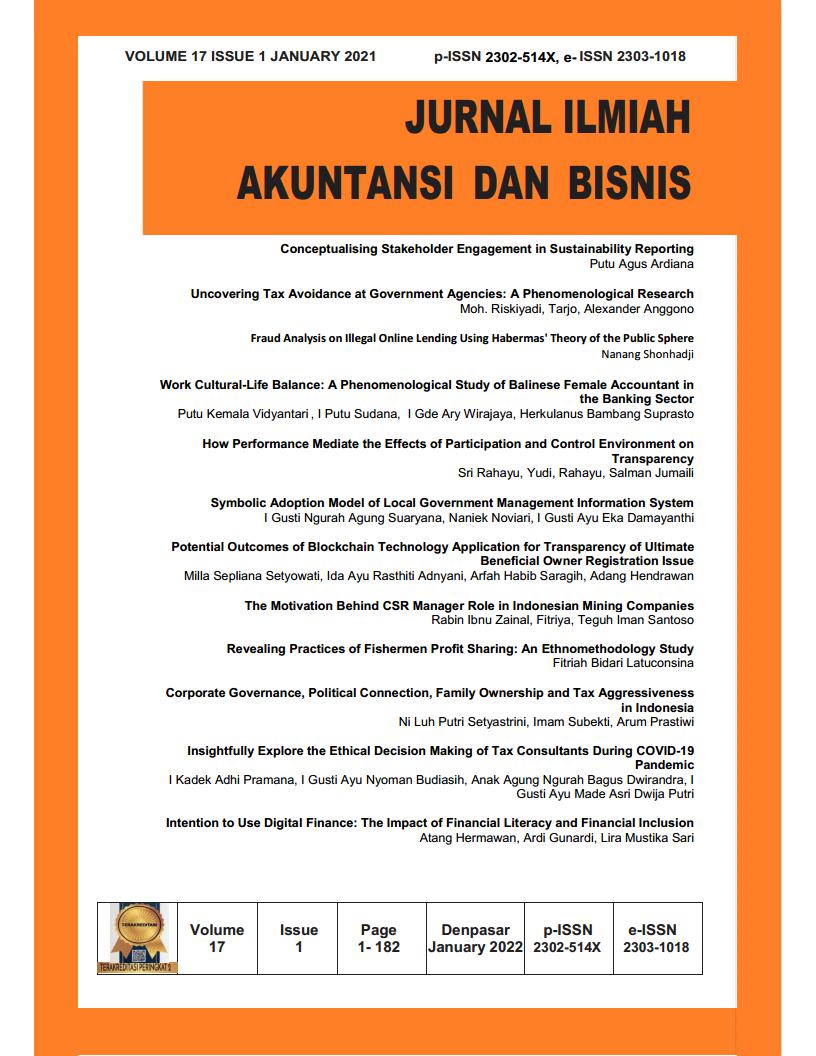The Motivation Behind CSR Manager Role in Indonesian Mining Companies
Abstract
The goal of this research is to investigate the underlying motivations for the role of the CSR manager. The study used smart PLS analysis to identify three motivations behind the role of CSR managers in mining companies, namely economic, legal and ethical domains. The study includes 114 managers or representatives from CSR-implementing mining companies in South Sumatera, Indonesia. The manager of mining companies in this region is mandated to implement CSR based on the rules of legislation. The study found that following Indonesian CSR legislation is not a significant motivation for CSR managers. Instead, CSR managers' decisions are influenced by economic motivation. Furthermore, analysis results revealed that CSR managers' motivation for economic and legal domains influenced their role in CSR.
Keywords: CSR, mining companies, motivation, role.
Downloads
References
Apriliani, N. A. (2021). Implementation of Good Corporate Governance (GCG) At the Ministry of Environment and Forestry. Studi Ilmu Manajemen Dan Organisasi, 2(1), 47–60.
Berger, I. E., Cunningham, P. H., & Drumwright, M. E. (2007). Mainstreaming corporate social responsibility: Developing markets for virtue. California Management Review, 49(4), 132–157.
Carroll, A. B. (1991). The pyramid of corporate social responsibility: Toward the moral management of organizational stakeholders. Business Horizons, 34(4), 39–48.
Cesar, S. (2020). Corporate social responsibility fit helps to earn the social license to operate in the mining industry. Resources Policy, 101814.
Chambers, E., Chapple, W., Moon, J., & Sullivan, M. (2003). CSR in Asia: A seven country study of CSR website reporting.
Dare, J. (2016). Will the truth set us free? An exploration of CSR motive and commitment. Business and Society Review, 121(1), 85–122.
Dinas ESDM Provinsi Sumsel. (2020). Daftar IUP Provinsi Sumatera Selatan (List of IUP in South Sumatera).
Friedman, M. (2007). The social responsibility of business is to increase its profits. In Corporate ethics and corporate governance (pp. 173–178). Springer.
Gjølberg, M. (2011). Explaining regulatory preferences: CSR, soft law, or hard law? Insights from a survey of Nordic pioneers in CSR. Business and Politics, 13(2), 1–31.
Hemingway, C. A., & Maclagan, P. W. (2004). Managers’ personal values as drivers of corporate social responsibility. Journal of Business Ethics, 50(1), 33–44.
Ismail, M., Kassim, M. I., Amit, M. R. M., & Rasdi, R. M. (2014). Orientation, attitude, and competency as predictors of manager’s role of CSR-implementing companies in Malaysia. European Journal of Training and Development.
Jang, S., & Ardichvili, A. (2020). Examining the link between corporate social responsibility and human resources: Implications for HRD research and practice. Human Resource Development Review, 19(2), 183–211.
Joshi, A., Kale, S., Chandel, S., & Pal, D. K. (2015). Likert scale: Explored and explained. British Journal of Applied Science & Technology, 7(4), 396.
Karaosmanoglu, E., Altinigne, N., & Isiksal, D. G. (2016). CSR motivation and customer extra-role behavior: Moderation of ethical corporate identity. Journal of Business Research, 69(10), 4161–4167.
Kemp, M. (2001). Corporate social responsibility in Indonesia: quixotic dream or confident expectation?
Kloko, D. M. E., & Bayunitri, B. I. (2020). Comparison analysis of financial performance telecommunication service which has and has not applied PSAK 73. International Journal of Financial, Accounting, and Management, 2(2), 145–157.
Maas, K., & Liket, K. (2011). Talk the walk: Measuring the impact of strategic philanthropy. Journal of Business Ethics, 100(3), 445–464.
Purwanto, A., Asbari, M., & Santoso, T. I. (2021). Analisis Data Penelitian Marketing: Perbandingan Hasil antara Amos, SmartPLS, WarpPLS, dan SPSS Untuk Jumlah Sampel Besar. Journal of Industrial Engineering & Management Research, 2(4), 216–227.
Schwartz, M. S., & Carroll, A. B. (2003). Corporate social responsibility: A three-domain approach. Business Ethics Quarterly, 13(4), 503–530.
Tukur, S., Shehu, J., Mammadi, A., & Sulaiman, U. A. (2019). An assessment of corporate social responsibility of property developers in Bauchi Metropolis, Nigeria. International Journal of Financial, Accounting, and Management, 1(2), 119–129.
Visser, W. (2008). Corporate social responsibility in developing countries. In The Oxford handbook of corporate social responsibility.
Zainal, R. I. (2019). Analysis of CSR Legislation in Indonesia: Mandate to Business. Business and Economic Research, 9(3), 165–181.
Zainal, R. I. (2020). Stakeholders Perception on Mandated CSR Laws in Indonesia. In 3rd Global Conference On Business, Management, and Entrepreneurship (GCBME 2018), Atlantis Press (pp. 210–216).




















